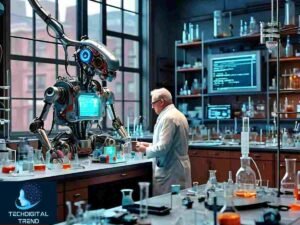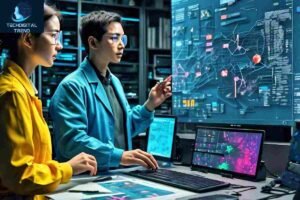Table of Contents
ToggleEternal Youth
Artificial Intelligence (AI) has revolutionized various aspects of our lives, from how we work to how we play. But could it also hold the key to eternal youth? People have been searching for the fountain of youth or the elixirs of life for as long as mankind has been. These myths and tales are generally based on this idea. AI looks to be a step closer to providing everlasting youth than it has ever been, since technology is developing at a rate never seen before. An examination of AI’s potential to prolong, improve, and rejuvenate human life is presented in this article.
The Evolution of AI
Artificial Intelligence, once a concept confined to science fiction, has now become a cornerstone of modern technology. The journey of AI began in the 1950s with simple machine learning algorithms. Over the decades, significant milestones such as the development of neural networks, deep learning, and the advent of big data have propelled AI into the forefront of innovation. Today, AI systems can perform complex tasks, analyze vast amounts of data, and even mimic human intelligence to some extent.
Understanding Eternal Youth
The idea of eternal youth has captivated human imagination for centuries. Historically, it was depicted in various cultures through myths and legends. In modern times, the desire for eternal youth translates into a quest for longevity and maintaining a youthful appearance. The science behind aging involves understanding cellular processes, genetic factors, and environmental influences that contribute to the aging process. By unraveling these mysteries, we can explore ways to slow down or even reverse aging called Unlocking Eternal Youth.

AI in Healthcare and Longevity
One of the most promising areas where AI can contribute to longevity is healthcare. AI’s ability to process and analyze large datasets can lead to breakthroughs in medical research. For instance, predictive analytics powered by AI can help identify potential health risks and suggest preventive measures. Personalized medicine, which tailors treatments to an individual’s genetic makeup, is another area where AI is making significant strides. By understanding the unique genetic blueprint of each person, AI can recommend targeted therapies that improve health and extend lifespan.
AI and Anti-Aging Technologies
The cosmetic and skincare industries have also embraced AI to develop innovative anti-aging solutions. AI algorithms analyze skin conditions and recommend personalized skincare routines. Moreover, the development of anti-aging drugs and supplements is being accelerated by AI, which can identify promising compounds and predict their efficacy. Regenerative medicine, which involves repairing or replacing damaged tissues, is another frontier where AI is making a significant impact.
AI-Driven Lifestyle Interventions
Maintaining a youthful appearance and good health goes beyond medical treatments. Lifestyle factors such as diet, exercise, and mental well-being play crucial roles. AI can optimize nutrition by analyzing dietary habits and recommending personalized meal plans. AI-guided fitness programs tailor exercise routines to individual needs, maximizing benefits. Additionally, mental health apps powered by AI provide support and guidance, promoting overall well-being.
Genetic Engineering and AI
The combination of AI and genetic engineering holds immense potential for extending lifespan. CRISPR, a revolutionary gene-editing technology, allows precise modifications to DNA. When combined with AI, it can target specific genes associated with aging and make beneficial changes. However, genetic modifications for longevity raise ethical considerations, including the potential for unintended consequences and the implications of altering human genetics.
AI and Nanotechnology
Nanotechnology, the manipulation of matter at the nanoscale, is another exciting field where AI can contribute to eternal youth. Nanobots, tiny robots operating at the cellular level, can repair and regenerate tissues, potentially reversing signs of aging. AI plays a crucial role in controlling and guiding these nanobots, ensuring precise and effective interventions. However, the development and deployment of nanotechnology face significant challenges, including technical limitations and safety concerns.
AI and the Human Brain
Enhancing cognitive functions and combating neurodegenerative diseases are vital aspects of achieving eternal youth. AI can enhance neuroplasticity, the brain’s ability to reorganize itself, by providing personalized cognitive training programs. Additionally, AI’s ability to analyze brain data can lead to early detection and treatment of conditions such as Alzheimer’s disease. By maintaining cognitive health, AI can help individuals retain their mental acuity as they age.
Ethical Implications of AI and Eternal Youth
The pursuit of eternal youth through AI raises several ethical questions. Moral dilemmas arise from the potential inequalities in access to AI-driven longevity treatments. Societal impacts, such as the implications of an aging population living longer, need to be considered. Furthermore, the integration of AI into human lives prompts questions about the future of humanity and the essence of what it means to be human.
Challenges in Achieving Eternal Youth Through AI
While the potential of AI in achieving eternal youth is immense, several challenges must be addressed. Technical limitations, such as the complexity of biological systems and the need for advanced AI algorithms, pose significant hurdles. Financial constraints also play a role, as developing and deploying AI-driven longevity treatments can be costly. Regulatory and ethical hurdles must be navigated to ensure the safe and equitable use of AI in this field.

The Future of AI and Eternal Youth
Despite the challenges, the future of AI and eternal youth looks promising. Upcoming technologies and innovations, such as advanced AI algorithms and new biotechnologies, hold the potential to revolutionize longevity. Predictions for the next decade include significant breakthroughs in personalized medicine, regenerative therapies, and cognitive enhancement. The long-term vision for AI and human longevity involves integrating these technologies into everyday life, allowing individuals to live longer, healthier, and more youthful lives called Unlocking Eternal Youth.
Case Studies and Real-World Applications
Numerous research projects and real-world applications demonstrate the potential of AI in achieving eternal youth. Notable projects include AI-driven drug discovery platforms, personalized skincare apps, and cognitive training programs. Success stories highlight the tangible benefits of AI, such as improved health outcomes and enhanced quality of life. These case studies provide valuable insights and lessons for future research and development.
Public Perception and Acceptance
The success of AI-driven longevity solutions depends on public perception and acceptance. Society’s views on AI in healthcare and longevity are influenced by media representations and pop culture. Addressing fears and misconceptions is crucial for gaining public trust. Engaging with the public through transparent communication and ethical practices can foster acceptance and support for AI-driven longevity solutions.
conclusion
Open this link: tap to here














